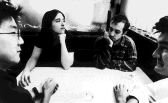THE MAGNETIC FIELDS (Opera House, Saturday, 4:30-6:00pm) If you never got around to picking up the three-disc set with the cutely self-explanatory title, you better set aside the 45 bucks right now. ‘Cause after you see Stephin Merritt, the “Luckiest Guy on the Lower East Side,” you’ll probably rush out and buy his wonderful 69 Love Songs. Admittedly, Merritt and his various musical incarnations aren’t for everyone. One must be clever enough to wade through the insolent cynicism; musically adept enough to appreciate his myriad musical homages (from show tunes to new wave, from pop back to indie rock); big-hearted enough to openly accept his smug aloofness and flamboyant schemes; and astute enough to read between his expertly crafted lines. Oh yeah, and it helps to have a serious sense of humor. Alas, a singer-songwriter (Merritt bristles at the term, but we’ll use it anyway) who asks so much from his audience must abundantly return the favor, right? Yes, and Merritt does. —Laura Learmonth
MODEST MOUSE (Boombox/Key Arena, Monday, 4:30-5:45pm) Why do the best rock shows of Bumbershoot always get quarantined to the indoor venues? Why is my favorite band not playing outdoors at Memorial Stadium? Why does this show overlap with Quasi’s? These questions haunt me, though not nearly as much as the songs from the recent The Moon and Antarctica do. Modest Mouse’s major label opus does as much to prompt new questions about life, love, liberty, and the pursuit of happiness as it does to allay age-old queries about those very same things. For every guitar line spiraled and waxed into oblivion, another is perfectly resolved and simple. For every door opened, one gets slammed fiercely in your face. Modest Mouse might well be music’s reigning experts at melding intelligent guitar rock with intense and emotional introspection. If you miss this show I’ll kick your ass.—L.L
COMMON (Boombox/Key Arena, Saturday, 5:30-6:45pm) The 27-year-old MC formerly known as Common Sense, and before that as Lonnie Rashid Lynn (and formerly known as a Chicagoan; he now lives in Brooklyn), is frequently cited as one of hip-hop’s best lyricists. On the new Like Water for Chocolate (MCA) he makes his presence felt over the kind of clipped funk beats and expansive soul horns that also typify D’Angelo and the Roots; it’s little surprise that the album’s executive producer is the latter’s drummer, Ahmir “?uestlove” Thompson, who also smacks the skins on D’Angelo’s Voodoo. Lyrically, Common’s rep is derived from his unblinking tackling of tough moral and philosophical questions: “Retrospect for Life,” from 1998’s One Day It’ll All Make Sense, dealt with abortion, while the new album’s “A Film Called Pimp” undercuts the clich鳠of player life with help from scene-stealer MC Lyte. All this and Common can rock a party: Witness his recent collaboration with house king Armand Van Helden.—Michaelangelo Matos
BIG STAR (Boombox/Key Arena, Saturday 2-3:15pm) Big Star released its only three studio albums in a vacuum, not even garnering enough attention to tour the United States in their day. The band broke up in 1975, with cofounders and songwriters Alex Chilton and Chris Bell starting off on what would become modest solo careers. Bell died in a car accident in 1979, a few years prior to the canonizing of his classic power-pop band; by the mid-’80s and through to today, no aspiring musician’s record collection could be called complete without #1 Record, Radio City, and Sister Lovers. With Bell gone, Chilton and drummer Jody Stephens signed up Big Star acolytes (and Seattleites) Jon Auer and Ken Stringfellow to participate in a one-off reunion show in 1993, and the foursome had such a blast that they play the occasional special gig. Still, this may be a once-in-a-lifetime opportunity to see one of America’s most influential bands, without whom we’d never have been treated to Teenage Fanclub, R.E.M., or Elliott Smith. —Richard A. Martin
ABDULLAH IBRAHIM TRIO (Opera House, Monday, 7:30-9pm) A living testament to the globality of music, Adolph Johannes Brand got turned on to American jazz legends like Duke Ellington and Fats Waller while growing up in South Africa in the ’40s. Though Waller and others would inspire his piano playing, Brand—who became Abdullah Ibrahim after converting to Islam in 1968—also soaked in the vibrant African musics he encountered in Cape Town. The two spheres collided in his own songs, which have been electrifying jazz audiences for more than 30 years. Under the Ibrahim name and as Dollar Brand, this pianist’s fluid, irreverent rhythms stand up to comparison with Monk’s, and his use of prominent African players (such as trumpet/flugelhorn player Hugh Masekela) has yielded some of the most worldly and colorful jazz of the latter half of the 20th century. At 65, Ibrahim tours less frequently, especially since resettling in South Africa after sojourns in Europe and the US during apartheid. His visit to Bumbershoot therefore rates a must-see.—R.A.M.
And when you’re done with that…




